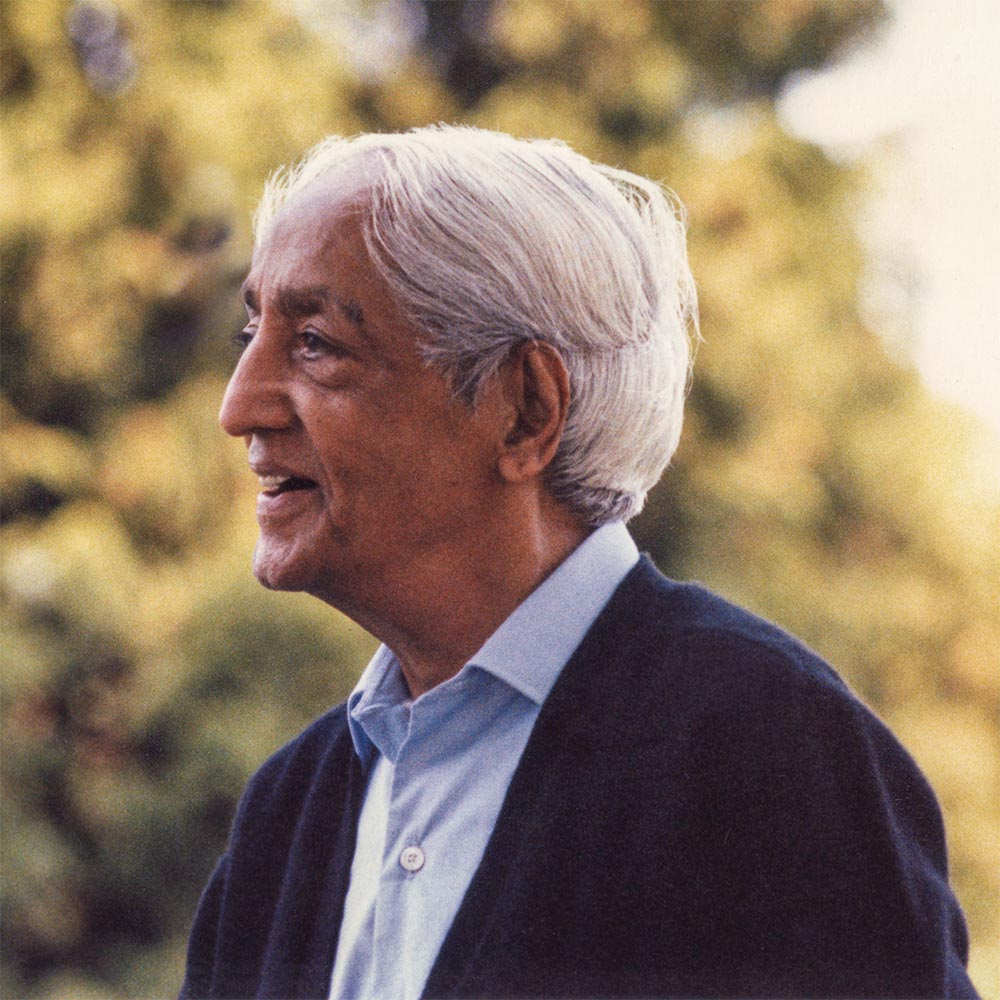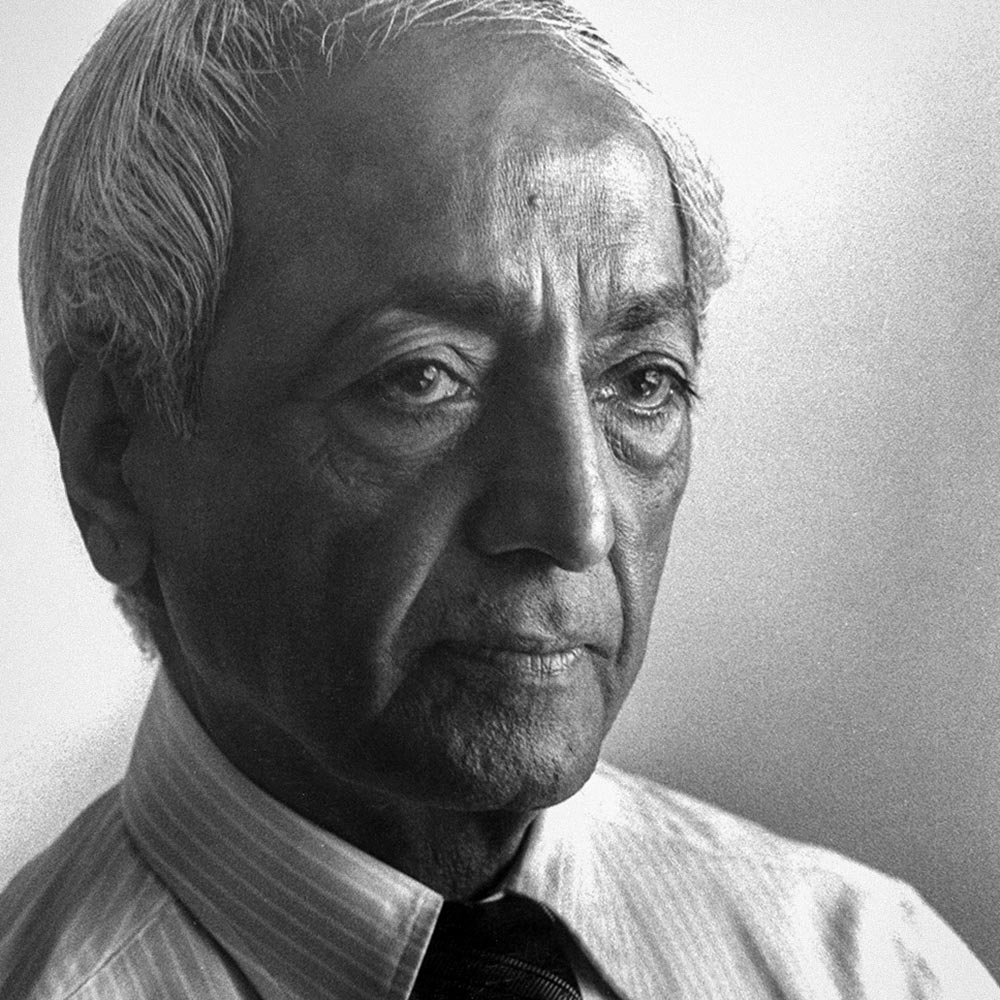We want security, both outwardly and inwardly. Therefore, we depend on others.
Krishnamurti, The Awakening of Intelligence
Read More
There must be order, physical security, for every human being in the world.
Krishnamurti, The Awakening of Intelligence
Read More
Without order, the brain cannot function; it becomes neurotic. Like a child, it needs complete security.
Krishnamurti, Tradition and Revolution
Read More
Like a monk who operates within a small cell and lives in a pattern, the mind wanting security lives in a pattern, without change.
Krishnamurti, Tradition and Revolution
Read More
Man has built in himself images as a fence of security: religious, political, personal. These manifest as symbols, ideas and beliefs.
Krishnamurti, To Be Human
Read More
When you create an image, there is security in that image, however false, however unreal, however insane.
Krishnamurti, To Be Human
Read More
Man, in his restlessness, in his desire for safety, for security, to feel at ease, has invented imaginary securities projected by thought.
Krishnamurti, The Impossible Question
Read More
Outwardly and inwardly, we are seeking security. That is why we have invented God, because that is the ultimate security.
Krishnamurti, Where Can Peace Be Found?
Read More
When thought seeks security, it makes it into something permanent, immovable, and therefore it becomes mechanical.
Krishnamurti, The Impossible Question
Read More
It is our earth on which we are all living, though politically and economically we have divided it for security and for patriotic, illusory reasons, which eventually bring about war.
Krishnamurti, Can Conflict End?
Read More
As long as each one of us is seeking psychological security, the physiological security we need – food, clothing and shelter – is destroyed.
Krishnamurti, The First and Last Freedom
Read More
Disturbance is essential for understanding, and any attempt to find security is a hindrance to understanding.
Krishnamurti, The First and Last Freedom
Read More
Thought, which has sought security in fragmentation, destroys what it is seeking. In non-fragmentation is complete security.
Krishnamurti, Can the Mind be Quiet?
Read More
There is security only in intelligence.
Krishnamurti, Can Conflict End?
Read More
Only compassion is that intelligence which gives humanity security, stability, a vast sense of strength.
Krishnamurti, Where Can Peace Be Found?
Read More
These quotes only touch on the many subjects Krishnamurti inquired into during his lifetime. His timeless and universal teachings can be explored using the Index of Topics where you will find texts, audio and video related on many themes. Another option is to browse our selection of curated articles or more short quotes. Krishnamurti’s reply when asked what lies at the heart of his teachings can be found here. Many Krishnamurti books are available, a selection of which can be explored here. To find out more about Krishnamurti’s life, please see our introduction and the biography. We also host a weekly podcast, and offer free downloads. Please visit our YouTube channel for hundreds of specially selected shorter clips. Below, you can learn more about Krishnamurti and our charity which he founded in 1968.

Who Was Krishnamurti?
J. Krishnamurti (1895-1986) is widely regarded as one of the greatest thinkers and religious teachers of all time. He spoke throughout the world to large audiences and to individuals, including writers, scientists, philosophers and educators, about the need for a radical change in mankind. Referring to himself, Krishnamurti said:
He is acting as a mirror for you to look into. That mirror is not an authority. It has no authority, it’s just a mirror. And when you see it clearly, understand what you see in that mirror, then throw it away, break it up.
Krishnamurti was concerned with all humanity and held no nationality or belief and belonged to no particular group or culture. In the latter part of his life, along with continuing to give public talks, he travelled mainly between the schools he had founded in India, Britain and the United States, which educate for the total understanding of man and the art of living. He stressed that only this profound understanding can create a new generation that will live in peace.
Krishnamurti reminded his listeners again and again that we are all human beings first and not Hindus, Muslims or Christians, that we are like the rest of humanity and are not different from one another. He asked that we tread lightly on this earth without destroying ourselves or the environment. He communicated to his listeners a deep sense of respect for nature. His teachings transcend man-made belief systems, nationalistic sentiment and sectarianism. At the same time, they give new meaning and direction to mankind’s search for truth. His teaching is timeless, universal and increasingly relevant to the modern age.
I am nobody. It is as simple as that. I am nobody. But what is important is who you are, what you are.
Krishnamurti
Krishnamurti spoke not as a guru but as a friend. His talks and discussions are based not on tradition-based knowledge but on his own insights into the human mind and his vision of the sacred, so he always communicated a sense of freshness and directness, although the essence of his message remained unchanged over the years. When Krishnamurti addressed large audiences, people felt that he was talking to each of them personally, addressing their own particular problem. In his private interviews, he was a compassionate teacher, listening attentively to those who came to him in sorrow, and encouraging them to heal themselves through their own understanding. Religious scholars found that his words threw new light on traditional concepts. Krishnamurti took on the challenge of modern scientists and psychologists and went with them step by step, discussing their theories and sometimes enabling them to discern the limitations of their theories.
Krishnamurti left a large body of literature in the form of public talks, writings, discussions with teachers and students, scientists, psychologists and religious figures, conversations with individuals, television and radio interviews, and letters. Many of these have been published as books, in over 60 languages, along with hundreds of audio and video recordings.

The Krishnamurti Foundation
Established in 1968 as a registered charity, and located at The Krishnamurti Centre, Krishnamurti Foundation Trust exists to preserve and make available Krishnamurti’s teachings.
The Foundation serves a global audience by providing worldwide free access to Krishnamurti videos, audio and texts to those who may be interested in pursuing an understanding of Krishnamurti’s work in their own lives.
In describing his intentions for the Foundations, Krishnamurti said:
The Foundations will see to it that these teachings are kept whole, are not distorted, are not made corrupt.

